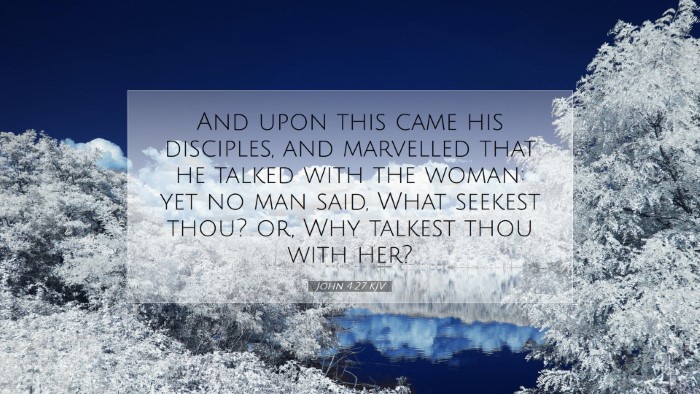Bible Commentary on John 4:27
In John 4:27, we find a pivotal moment in the interaction between Jesus and the Samaritan woman at the well. The verse states:
"And upon this came his disciples, and marvelled that he talked with the woman: yet no man said, What seekest thou? or, Why talkest thou with her?" (John 4:27, KJV)
Contextual Overview
This passage occurs shortly after Jesus reveals profound truths about spiritual thirst and worship. The disciples return from buying food and encounter an unexpected scene: their Master, a Jewish man, engaged in conversation with a Samaritan woman — an act laden with cultural and social implications.
Commentary Insights
Disciples' Marvel and Cultural Tension
- Matthew Henry: Henry emphasizes the disciples' astonishment, noting that their marvel reveals their ignorance of Jesus' mission to reach out to all, regardless of their race or gender. He illustrates the deep-seated prejudices of the time, explaining that Jews typically avoided Samaritans, yet Jesus breaks this barrier willingly.
- Albert Barnes: Barnes elaborates on the surprise of the disciples, interpreting it as a moment of revelation for them. He comments that their questions, though unvoiced, point to a deeper misunderstanding of Jesus’ revolutionary ministry. It showcases the contrast between societal norms and the inclusiveness of Christ's message.
- Adam Clarke: Clarke draws attention to the disciples’ silence regarding the conversation. They refrained from questioning Jesus directly, perhaps out of respect or confusion. Clarke suggests that this silence also indicates their spiritual immaturity at this point in their discipleship journey.
Spiritual Significance
- Introduction of the Gospel to Gentiles: All three commentaries accentuate that this encounter signifies the widening scope of Jesus' ministry. Henry posits that the dialogue with the Samaritan woman foreshadows the evangelistic mission to the Gentiles, reflecting the universality of salvation.
- The Role of Women: Barnes points out that this narrative stands as a pivotal moment for the recognition of women within the ministry of Jesus. The discourse serves to validate women as credible witnesses and carriers of the gospel, challenging cultural norms of the period.
- The Divine Appointment: Clarke highlights the significance of divine appointments. The discussion at Jacob's well was not coincidental but orchestrated by God, thus urging the church to embrace and follow divine guidance in ministry and personal encounters.
Theological Implications
- Breaking Social Barriers: Matthew Henry relates this moment to broader theological discussions about breaking social barriers. The act of Jesus speaking with a Samaritan woman encapsulates the heart of the gospel that transcends ethnic, cultural, and gender divisions.
- Faith and Recognition: In light of the disciples’ astonishment, Barnes reflects on the gradual revelation of faith. The disciples are depicted as still needing enlightenment regarding who Jesus is and the full scope of His ministry.
- Empowerment of Believers: Clarke stresses that this encounter signifies the empowerment of believers. The woman at the well becomes an early Evangelist, illustrating that all believers are called to share their testimonies, regardless of social status or background.
Conclusion
John 4:27 is more than a moment of curiosity. It is a profound intersection of culture, faith, and revelation. Through the unfiltered dialogue between Jesus and the Samaritan woman, we witness the dismantling of cultural divides and the invitation for all to partake in the living water offered by Christ. The marvel of the disciples acts as a mirror for the church today, prompting reflection on our own perceptions of who is welcome in God's kingdom. In our journey as followers of Christ, may we learn to embrace the unexpected and support the divine appointments that guide us in sharing the gospel with everyone, regardless of status or background.


